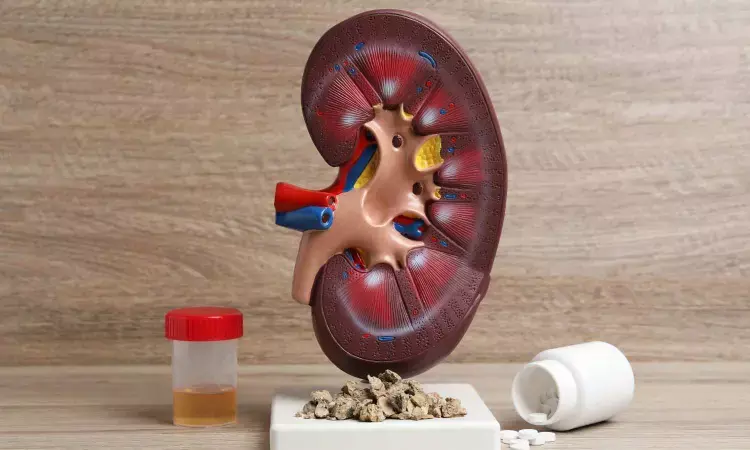- Home
- Medical news & Guidelines
- Anesthesiology
- Cardiology and CTVS
- Critical Care
- Dentistry
- Dermatology
- Diabetes and Endocrinology
- ENT
- Gastroenterology
- Medicine
- Nephrology
- Neurology
- Obstretics-Gynaecology
- Oncology
- Ophthalmology
- Orthopaedics
- Pediatrics-Neonatology
- Psychiatry
- Pulmonology
- Radiology
- Surgery
- Urology
- Laboratory Medicine
- Diet
- Nursing
- Paramedical
- Physiotherapy
- Health news
- Fact Check
- Bone Health Fact Check
- Brain Health Fact Check
- Cancer Related Fact Check
- Child Care Fact Check
- Dental and oral health fact check
- Diabetes and metabolic health fact check
- Diet and Nutrition Fact Check
- Eye and ENT Care Fact Check
- Fitness fact check
- Gut health fact check
- Heart health fact check
- Kidney health fact check
- Medical education fact check
- Men's health fact check
- Respiratory fact check
- Skin and hair care fact check
- Vaccine and Immunization fact check
- Women's health fact check
- AYUSH
- State News
- Andaman and Nicobar Islands
- Andhra Pradesh
- Arunachal Pradesh
- Assam
- Bihar
- Chandigarh
- Chattisgarh
- Dadra and Nagar Haveli
- Daman and Diu
- Delhi
- Goa
- Gujarat
- Haryana
- Himachal Pradesh
- Jammu & Kashmir
- Jharkhand
- Karnataka
- Kerala
- Ladakh
- Lakshadweep
- Madhya Pradesh
- Maharashtra
- Manipur
- Meghalaya
- Mizoram
- Nagaland
- Odisha
- Puducherry
- Punjab
- Rajasthan
- Sikkim
- Tamil Nadu
- Telangana
- Tripura
- Uttar Pradesh
- Uttrakhand
- West Bengal
- Medical Education
- Industry
Half of patients with low-grade proteinuria develop treatable lupus nephritis within two years

New research presented this week at ACR Convergence 2022, the American College of Rheumatology's annual meeting, found that 50% of people with low-grade proteinuria, which is protein in your urine, progress to clinical proteinuria within two years and show treatable lupus nephritis on biopsies. These "fast progressors" may benefit from early biopsies to detect lupus nephritis sooner, although further studies-the next step-are needed to confirm this.
Lupus nephritis, a complication of systemic lupus erythematosus (SLE, lupus), causes considerable morbidity and mortality. Kidney biopsy remains the gold standard for diagnosis of lupus nephritis and current guidelines recommend a biopsy for proteinuria equal to or greater than 0.5 gram a day (with or without active urinary sediment). However, some patients may have ongoing inflammation when they first present with low-grade proteinuria and may potentially have irreversible kidney damage by their first biopsy. This study aimed to assess proteinuria progression in patients with low-grade proteinuria-0.2 to 0.5 urine protein to creatinine (UPCR)-and identify risk factors for progression to clinical proteinuria equal to or greater than 0.5 gram per day.
SLE patients with low-grade proteinuria but without known lupus nephritis were identified from the Einstein Rheumatic Disease Registry. Those who developed a UPCR equal to or greater than 0.5 during follow-up were defined as "progressors." A subgroup who progressed to UPCR equal to or greater than 0.5 within two years were defined as "fast progressors."
In this cohort, more than half of SLE patients with low-grade proteinuria progressed to clinical proteinuria, and 16 of 20 biopsies performed in the first two years indicated treatable lupus nephritis.
"Fast progressors may benefit from early biopsy because they progress more quickly and therefore may have active inflammation at the time of low-grade proteinuria. That was the reason for looking at this subgroup, but it was also important to know how many people progress eventually," explains Anna Broder, MD, MS, a rheumatologist with Hackensack Meridian Medical Group and the study's lead author. "Early lupus nephritis diagnosis and effective intervention reduce long-term adverse kidney complications."
The researchers found that factors such as low complement, recent lupus onset, and younger age were associated with progression from low-grade to clinical proteinuria. However, the study wasn't designed to show whether early biopsies or treating low-grade proteinuria slow the progression to kidney disease, end-stage kidney disease, or death. It also didn't assess whether medications such as hydroxychloroquine and ACE inhibitors delay the onset of proteinuria in SLE patients.
"These critical questions will need to be addressed using randomized trials or large-scale pharmacoepidemiologic studies to minimize biases inherent in retrospective studies," says Dr. Broder.
The study's retrospective design led to other limitations.
"In particular, proteinuria was measured only by the protein to creatinine ratio. Although widely used, this is not the most accurate way to measure proteinuria. Biopsies were [also] not performed or were delayed for some patients for a variety of reasons, including differences in biopsy threshold guidelines over the years; patient preferences; socioeconomic barriers to care or insurance; high risk of complications and severe multiorgan disease requiring rapid escalation of immunosuppression for non-kidney manifestations. We could not determine if delays in biopsies resulted in higher chronicity," says Dr. Broder.
Reference:
Shudan Wang, Allan Spielman, Mindy Ginsberg, Brad Rovin, Jill Buyon and Anna Broder, Montefiore Medical Center / Albert Einstein College of Medicine, New York, NY, Albert Einstein College of Medicine, Bronx, NY, Johns Hopkins University School of Medicine, Division of Rheumatology, Baltimore, The Ohio State University, Columbus, OH, NYU Grossman School of Medicine, New York, NY, Hackensack University Medical Center, Hackensack,NJ
Dr Kamal Kant Kohli-MBBS, DTCD- a chest specialist with more than 30 years of practice and a flair for writing clinical articles, Dr Kamal Kant Kohli joined Medical Dialogues as a Chief Editor of Medical News. Besides writing articles, as an editor, he proofreads and verifies all the medical content published on Medical Dialogues including those coming from journals, studies,medical conferences,guidelines etc. Email: drkohli@medicaldialogues.in. Contact no. 011-43720751


